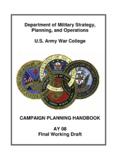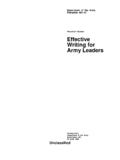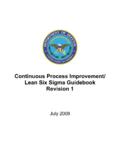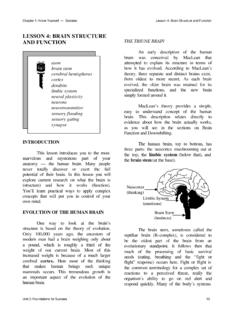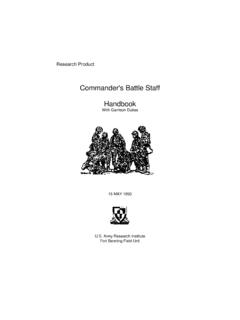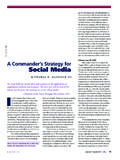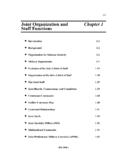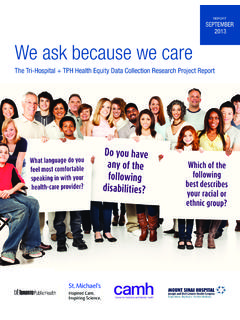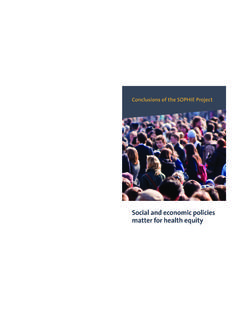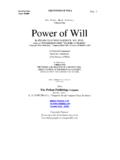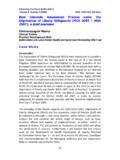Transcription of The Psychological Impact of Terrorist Attacks: …
1 CHAPTER 9 The Psychological Impact of Terrorist attacks : Lessons Learned For Future Threats Judith J. Mathewson Setting the Stage for Panic and Terror Crises can help us discover much about ourselves and enrich our lives. If disaster enriches our lives with gifts that would otherwise have been taken for granted, is it really a disaster? Or is it a gift in disguise?1 Elisabeth Kubler-Ross Virtually every epoch in American history makes mention of one or more significant disasters - fire, floods, hurricanes, tornadoes, volcanic eruptions, snowstorms and earthquakes are commonplace. Other disasters are human-made, caused by people through mishap or neglect, such as a work accident, apartment fire, or with deliberate intention, such as A disaster is roughly defined as any natural or human-induced event that causes damage to physical, social, Psychological or economic structures so as to require extraordinary assistance from outside the immediate Impact area.
2 Terrorism, on the other hand, is something relatively new to American history, especially mass casualty terrorism. So, how do we define terrorism? Terrorism is defined as the use of violence by fanatical extremists as a mode of governing or opposing governments by It is coercion of the civilian population, or any segment thereof, in furtherance of political or social Its aim is to immobilize the civilian population with fear and anxiety. terrorists terrorize by using threats or physical destruction to kill and maim innocent people, create sensationalism and chaos, and gain instant 191 The Psychological Impact of Terrorist attacks publicity for the Terrorist s cause.
3 The Terrorist acts are unprovoked and intentional, causing overwhelming fear. These acts evoke feelings of helplessness in individuals; terrorists randomly target innocent and defenseless groups of people. The battlefield is not the land upon which the attacks take place, but rather, it is the mind - the psychology - of those who The events of September 11, 2001, added a domestic reality to the term terrorism that all Americans had hoped would never be experienced. It has been estimated that somewhere between 9 percent and 35 percent of those directly exposed to traumatic events such as disasters and terrorism will develop significant posttraumatic Psychological distress and perhaps posttraumatic stress disorder (PTSD).
4 6 Psychotherapy alone, no matter how brief, seems inadequate to effectively respond to the Psychological needs of both civilian and military personnel in the wake of terrorism and disasters. As a result, acute Psychological crisis intervention, sometimes called Psychological first-aid, as well as other forms of emergency mental health interventions have been recommended to address the earliest Psychological needs subsequent to disasters and acts of Both types of disasters, natural and human-made, can elicit fear, anger and worry in victims, their families and friends and could lead to Psychological symptoms of anxiety and depression.
5 Research has shown that human-made disasters are more psychologically pathogenic than are natural disasters. Terrorism may be the most pathogenic of all due to its unpredictable and unrestrained This chapter will describe the phases of Terrorist attacks and examine the Psychological Impact of Terrorist events on Americans, focusing on military members and civilian State Department employees. It will evaluate training programs and emphasize the importance of resiliency training to prepare individuals for future attacks . To begin, it is important to understand the three fundamental phases of the Terrorist attack: first, the pre-attack/pre-crisis phase, secondly, the acute event itself and third, the consequence management/reconstruction phase.
6 These three phases have been identified in response to major disasters throughout the world over the past 20 years, according to Dr. George S. Everly and Jeffrey T. Mitchell, , founders of the International Critical Incident Stress Foundation, Inc. They created this 192 Mathewson structure for understanding the phases of terrorism and to prepare primary target populations and emergency The pre-attack, pre-crisis phase is the time period prior to the actual attack. During this phase, both threat assessment and prevention are very important and are performed by law enforcement, military, and the intelligence resources available.
7 The military does this well by incorporating such considerations into its exercises and force protection strategy. The civilian sector is not so well prepared. Current events show that the civilian community needs to design and implement disaster exercises to identify possible threats and vulnerabilities and to educate its personnel on possible safety concerns. Phase two implements the plan designed from phase one. Doctors Everly and Mitchell believe that the better prepared the American population is for a Terrorist event, the less severe the overall Impact of the As an example of all three phases of the attack, a young electronic warfare officer (EWO) learned a few lessons about terrorism that have stayed with him for many years.
8 Talking about his experience brought back many painful memories for him. In Greece, during the late 1980 s, there was animosity against the United States and the Air Force mission in an unprotected area near the city of Athens. Yet, the aircrew was not prepared for a car bomb that detonated near its bus, which was traveling the same route from the hotel to the base and back for the prior six months. When the EWO s bus was attacked, he was stunned and cut by shards of glass, but intuitively tried to assist the injured Greek bus driver. Later, he felt extreme anger towards a fellow Air Force member who sprinted away after the attack without assisting anyone Although the EWO was later awarded a Purple Heart for his injuries, he felt frustrated since there was no follow-up counseling or training done, Critical Incident Stress Management (CISM) didn t exist at that time.
9 Those airmen who requested to return to the United States were called wimps by their commander, the victim explained. By definition, one is not prepared for a Terrorist attack out of the blue. It is not like going into battle a person is just doing his job when the attack occurs changing his life forever. 12 As a result of this attack, the buses transporting the aircrews are now armored and personnel wear protective flak vests. 193 The Psychological Impact of Terrorist attacks Conversely, at the Pentagon, there had been numerous fire and evacuation drills prior to the 9/11 attack; many permanent staff military and civilian personnel were accustomed to quickly and quietly evacuating the building due to these practice drills.
10 It was quite different from the World Trade Center attack, where people jumped to their deaths from the building due to panic and chaos. The second phase of the Terrorist attacks is the acute event management phase. This phase persists as long as event assessment, containment, rescue and recovery efforts continue. During this time, fire suppression, communications, law enforcement, rescue and emergency personnel perform their respective functions. Techniques such as crisis management briefings, defusings, demobilizations, and crisis counseling within the CISM system are This phase is one where counselors trained in trauma care can assist the emergency first responders and the victims during these crucial first hours.
